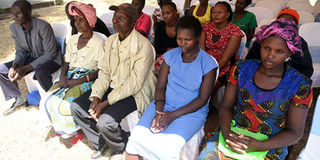Detained patients an eye-opener to our exorbitant healthcare system

Some of the 258 patients released from Kenyatta National Hospital on April 2, 2019 after being detained over unpaid bills. Our healthcare system needs urgent reforms. PHOTO | FILE | NATION MEDIA GROUP
What you need to know:
- A serious rethink is required on how healthcare can be made affordable to all citizens regardless of economic status.
- Curbing the rise in private healthcare would help seal loopholes for corruption where medicine and hospital equipment meant for public hospitals are wrongly transferred to private clinics and hospitals.
We read last week in the media about the release of patients who had been detained at Kenyatta National Hospital because of unpaid medical bills.
The release followed a report by the Ministry of Health on the number of patients locked up in hospitals across the country for being unable to settle their bills.
We are all familiar with the heart-wrenching story of Boniface Murage, who tried to smuggle his daughter out of hospital due to lack of fees.
His story is a testament to how exorbitant healthcare has made many poor Kenyans desperate.
I fail to see how Murage ended up with a criminal record, albeit suspended, when in fact all he was trying to do was act in desperation to access his child illegally detained in hospital.
The detention of patients for failing to pay their bills was declared illegal by the courts in a ruling recently in a case filed against Nairobi Women’s Hospital.
POVERTY
Justice Wilfrida Okwany deemed it a “violation of patients’ rights”, and our Constitution is clear on that.
It is disturbing to see public hospitals being the first to lock up patients for lack of fees, when in fact they should be easily and affordably accessed by the poorest in society.
It is important to review our healthcare system that seems to have sold its soul to financial interests at the expense of sustaining and saving patients’ lives.
Yes, indeed hospitals need money to survive, but given the billions of shillings we flush down the drains every week through graft, it is sheer insensitive and uncompassionate to allow many Kenyans to suffer the level of indignities that we witness in our healthcare institutions due to lack of funds.
According to the World Bank’s 17th Edition of Kenya Economic Update (2018), the proportion of Kenyans living on less than the International Poverty Line of $1.90 a day, or approximately Sh200, has declined from 46.8 per cent to 36.1 per cent.
This means that approximately over 16 million Kenyans would still struggle to access healthcare at the current regime set up via the National Hospital Insurance Fund (NHIF).
AFFORDABLE
For those with no income, they risk being locked out completely from accessing healthcare. A serious rethink is required on how healthcare can be made affordable to all citizens regardless of economic status.
Efforts need to be focused on curbing private clinics and hospitals that are sponging a huge amount of funds from the NHIF through the exorbitant fees charged.
Private health facilities and pharmacies have also proven to be a conduit through which drugs meant for public hospitals are siphoned off.
A few counties have woken up to address the menace by banning some of their clinicians from operating private clinics and pharmacies.
The spotlight needs to be shone on counties with the highest number of residents that live below the poverty line.
PRIVATE PRACTICE
There is no justification to have a concentration of private clinics and pharmacies in far-flung parts of the country that ought to be served by highly-resourced public hospitals instead.
The current licensing of private clinics to be set up on top of mutura cafes or bars exposes patients to serious health risks and exploitation.
Not every doctor needs to run a private clinic. Such temptations can be addressed by better pay for clinicians by the State in order to improve quality in public hospitals and retain the doctors desperately needed in the public sector.
Crucially, curbing the rise in private healthcare would help seal loopholes for corruption where medicine and hospital equipment meant for public hospitals are wrongly and criminally transferred to private clinics and hospitals.
REVAMP
The NHIF has been cited by Ethics and Anti-Corruption Commission (EACC) in its 2018 report as open to abuse by “greedy hospitals” out to make a profit.
There is a need, therefore, to review whether NHIF is value for money given the number of poor Kenyans unable to access universal healthcare.
Models worth considering are the Norwegian and UK systems of universal healthcare where care is generally accessed through public hospitals and funded through taxes, and where the national insurance scheme covers all citizens, including the unemployed and very poor.
The NHIF is not fit for purpose in its current form where financial interests to hospitals take precedence over the healthcare of citizens.
It needs reviewing now in order to streamline universal healthcare that the Big Four Agenda is aiming to achieve.
HUMAN RIGHT
The review is crucial in order to eradicate the tension created by the current system between hospitals and patients.
The government must put patients’ interests at the heart of healthcare over financial interests to pharmaceuticals and hospitals.
Universal healthcare is defined by the World Health Organisation as a “situation where citizens can access health services without incurring financial hardship”.
Our healthcare system is doing the opposite by putting many people in financial hardship and needs urgent reforms.
Ms Guyo is a legal researcher; [email protected] @kdiguyo





